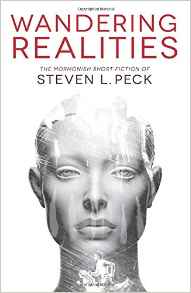 Title: Wandering Realities: Mormonish Short Fiction
Title: Wandering Realities: Mormonish Short Fiction
Author: Steven L. Peck
Publisher: Zarahemla Books
Genre: Short Fiction
Year Published: 2015
Number of Pages: Kindle: 221
Reviewed by Andrew Hall
A great collection of stories, 4.5 stars.
The stories are split into two groups, “Other Worlds” (speculative stories) and “This World” (not speculative, mostly). You could also divide his stories into short-shorts, that would fit into the Mormon Lit Blitz, and longer stories. The shorter speculative stories are usually “what if” about a technology, especially how that technology would effect future Mormons (AI, virtual reality available to kids, gene engineering, time travel). The short non-speculative stories are mostly about some kind of breakdown in the accepted/conservative Mormon world order (a Carol King song at a funeral, a Bishop killing neighborhood dogs that are keeping him awake, pinewood derby anarchy, a banker husband secretly quitting his job).
I enjoyed the shorter stories (especially “Avek, Who Is Distributed”, about an AI wanting to get baptized), but I find the longer stories, that are less dependent on a gimmick, more satisfying.
“Let the Mountains Tremble for Adoniha Has Fallen” and “Two Dog Dose”, both longer stories, were my favorites. “Let the Mountains Tremble” takes a fascinating premise and does an excellent job of world building. It imagines a Mormon colony on Mars which has decided to separate itself from the what it sees as the decadence of Earth. Sealed off from the earth for many centuries, the Mars Mormons (on purpose?) lost much of their technology, and have turned into a feudalistic and extremely patriarchal society. The story involves a renewed contact with Earth, and the revelation of an army of genetically engineered, but intellectually stunted, super soldier. The characters struggle with tensions between faith in the Church organization and reason.
“Two Dog Dose” is the story of two older men who made a pact to help the other die if they ever became incapacitated through dementia. It is an excellent portrayal of the pain of that situation.
“A Strange Report from the Church Archives”, which is also semi-long, is another favorite. It features a magical devise that allows the people of St. George to change the past and present by wishing it. The story follows a character who experiences those changes in real time, which is real entertaining.
“When the Bishop Started Killing Dogs” and “The Best Pinewood Derby Ever” are both funny short pieces about Utah Mormons under stress doing extreme things.
The longest story, “The Gift of the King’s Jeweler”, is a novella, set in the time of Old Testament Jeremiah. It is the most Mormon-friendly story, and was previously published by Covenant Commications. It is filled with uniquely (and somewhat dubious) Mormon ideas about Old Testament-era religion, like Jews believing that God’s Son would be Messiah, baptism, Book of Moses material in their scriptures, etc. It also has God working clearly and actively in the protagonist’s life, pushing him on an important mission. Is is very orthodox, much more than the other stories. But also has great writing.
The stories where common LDS assumptions are challenged are the ones that resonate with me the most. A prophet working from wrong assumptions, and needing to be tricked in “Adoniha”, and hope that the mercy killing of a man going into dementia is forgivable in “Two Dog Dose”.
“The Sacrifice” a new story not in the collection, is perhaps my favorite Peck story. While speculative, it is not science fiction, as most of the “Other World” stories in this collection are. It has contemporary characters placed in a mysterious fantasy-like place, and then a post-life realm. What if we find that the post-life world is not what we expected? It is similar to “Short Stay in Hell” in that way. But while “Short Stay in Hell” is based on the idea that Christianity is totally wrong, “The Sacrifice” is less clear. Some of the ideas of LDS Christianity are right, but then there is other stuff that goes in a very different direction. I assume that we are going to be very surprised by some of what we encounter in the next life. “The Sacrifice” appeared in Dialogue in 2019, you can read it here:
